Redditors Are Against Woman Who Wants To Give Her Son The Same Name As Her Late Cat
It's normal to experience shock, loss, and sadness after a beloved dog, cat, or any other pet passes away. We share a deep affection and bond with our animal companions.
For many of us, a pet is more than just a dog or a cat; it is a treasured family member who enriches our lives with friendship, amusement, and delight. A pet can provide structure to your day, keep you social and active, help you deal with life's obstacles and challenges, and even give you a sense of purpose.
So, it's common to experience overwhelming grief and loss after the death of a beloved pet. Losing a pet can feel overpowering and can bring on a wide range of distressing and challenging emotions.
You should never feel guilty or ashamed about grieving for an animal companion, even though some may not comprehend the level of affection you had for your pet. The intensity of grief you feel will often depend on factors such as the age of your pet and the circumstances of its death, even though everyone reacts to loss differently.
In general, the greater the emotional grief you experience, the more important your pet was to you. This Redditor missed her cat so much that she wanted to name her child after the cat.
Read the story for yourself below.
The Headline...

A Part of Me Wants a Reminder of My Dead Cat
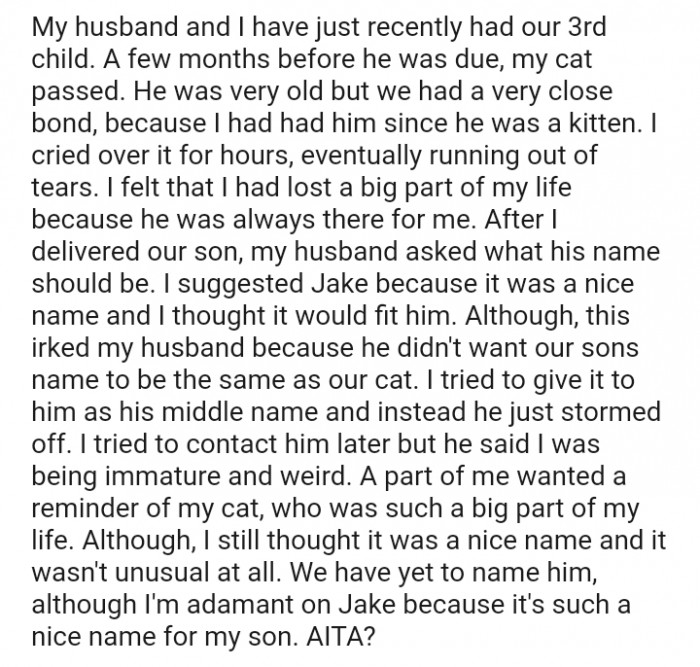
The comments rolled in, and every Redditor was of the opinion that the woman would be making a grave mistake by naming her child after her deceased cat. Here are some of the most upvoted comments:
1. Your Husband Already Said No

Emotional Attachments and Naming Choices
The desire to name a child after a beloved pet speaks to the deep emotional connections we form with animals.
Dr. Sarah Johnson, a developmental psychologist at Emory University, notes that naming reflects our values and attachments, often intertwining with our identities.
Her research suggests that these choices can evoke strong feelings of nostalgia and love, influencing family dynamics and expectations.
Understanding Emotional Attachments
The desire to name a child after a beloved pet reflects the deep emotional attachments that individuals can form with their animals.
Research in attachment theory suggests that pets often fulfill emotional needs similar to those met by human relationships, leading to profound bonds.
This can create challenges when these attachments intersect with societal norms and expectations surrounding naming conventions.
2. Don't Name Your Kid After Your Cat

3. Don't!

4. It's Not Just Your Decision to Make

The resistance from the husband may stem from his own emotional attachments and a desire to establish a unique identity for their child.
Studies in family psychology indicate that naming decisions can ignite conflicts, particularly when they challenge established norms or personal beliefs.
Understanding these dynamics is crucial for fostering healthy communication about naming preferences.
Naming a child after a pet can evoke mixed feelings from partners, highlighting the complexities of shared decision-making in parenting.
Studies show that disagreements over names can lead to conflict in relationships, particularly when emotional attachments are involved.
Understanding these dynamics can help couples navigate naming discussions more effectively.
5. What Your Child Will See as His Purpose in Life

6. Give Your Kid Another Nice Name

7. It Is Time to Find a Different Name

Finding Common Ground in Naming Decisions
To navigate this sensitive issue, it’s important for couples to engage in open discussions about their naming preferences and the significance behind them. Dr. Michele Weiner-Davis, a renowned marriage therapist, emphasizes, "When both partners feel heard in the decision-making process, it fosters a deeper connection." Encouraging a collaborative approach to naming can help both partners feel valued. Research from Dr. Michele Weiner-Davis suggests that shared decision-making can strengthen relationships and reduce conflict.
The Role of Compromise in Parenting
Compromise is essential in co-parenting, especially when emotional attachments complicate decisions.
Research suggests that successful co-parenting involves recognizing and respecting each other's feelings while finding common ground.
In this case, exploring alternative names that honor both the pet and the child's identity could foster a collaborative approach to naming.
8. It's Still Very Early in Your Grief

9. He Is Going to Hate You with a Passion

10. Your Husband Has the Right to Disagree

Establishing open communication is critical in discussing naming preferences.
Experts recommend using 'I' statements to express feelings and concerns without placing blame, facilitating a more productive dialogue.
This approach can help both partners feel heard and respected, paving the way for a mutually satisfying decision.
11. You Need to Respect His No

12. How Did You Decide on My Name?
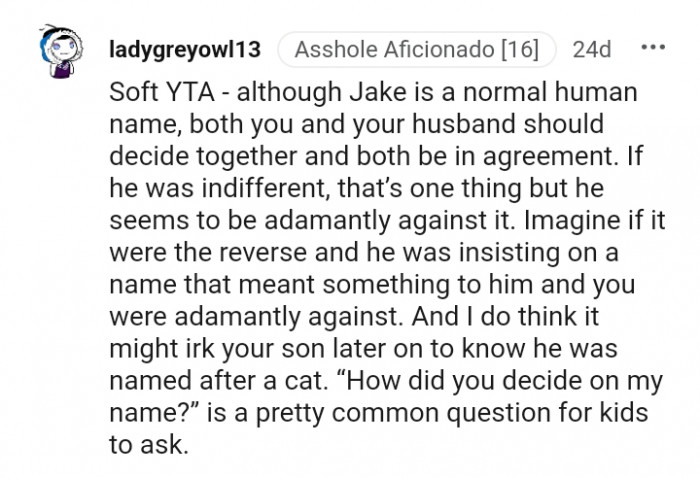
13. Your Son Doesn't Exist to Be a Reminder

14. Your Cat Was a Big Part of Your Life

15. A Baby Name Should Be Agreed Upon
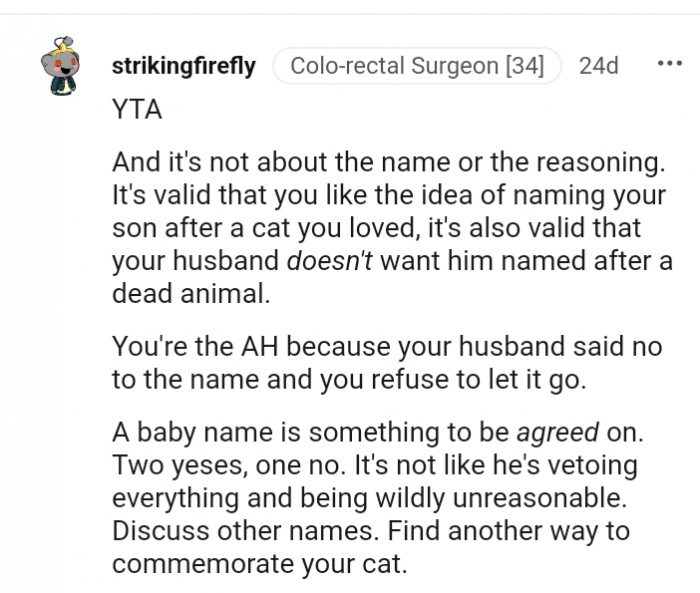
16. Don't Saddle Your Kid with the Name of Your Cat

17. This Redditor Is Tabling How the Future Discussion Will Look Like
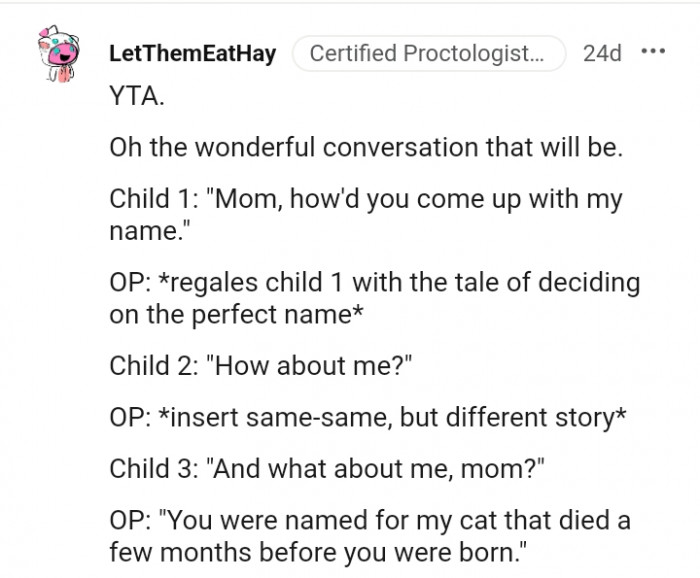
18. It's the Second Comment for Me

19. Let Your Son Be Someone Different Instead
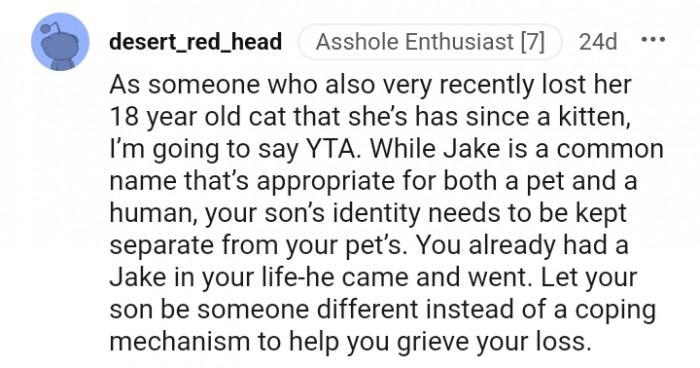
20. Name Your Next Pet Jake and Not Your Son

Here Is an Edit the OP Added Later On...

The significance of an animal in your life may also affect how you make decisions. The OP was clearly grieving over her deceased cat, and the Redditors made sure to set her straight.
What are your thoughts about this story? Are you in support of what the OP intended to do? Is the middle name a compromise or still a win for her?
Leave your replies in the comments section below.
Psychological Analysis
This situation highlights the emotional complexities involved in naming decisions and the importance of communication in co-parenting.
By fostering understanding and compromise, couples can navigate these challenges more effectively.
Analysis generated by AI
Analysis & Alternative Approaches
This scenario illustrates the complexities of emotional attachments and their impact on decision-making in parenting.
Research emphasizes the importance of open communication and compromise in fostering healthy co-parenting relationships.
Ultimately, navigating these dynamics can lead to more harmonious and satisfying outcomes for both parents.
Analysis & Alternative Approaches
Naming a child after a pet can evoke complex emotions, reflecting the deep bonds we share with our animals.
By fostering open dialogue and understanding in naming decisions, families can navigate these challenges more effectively.



